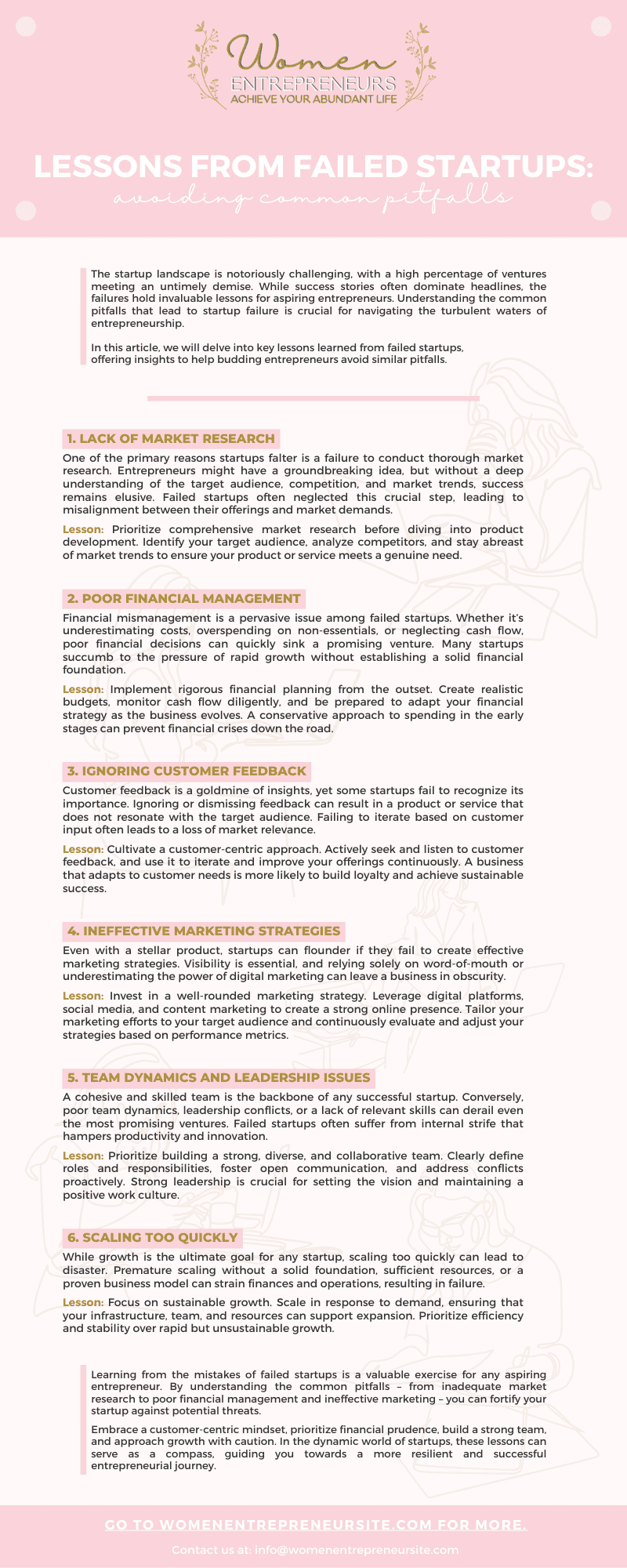In the realm of professional growth, there comes a pivotal moment for many individuals when the…
Lessons from Failed Startups: Avoiding Common Pitfalls

The startup landscape is notoriously challenging, with a high percentage of ventures meeting an untimely demise. While success stories often dominate headlines, the failures hold invaluable lessons for aspiring entrepreneurs. Understanding the common pitfalls that lead to startup failure is crucial for navigating the turbulent waters of entrepreneurship.
In this article, we will delve into key lessons learned from failed startups, offering insights to help budding entrepreneurs avoid similar pitfalls.
>> Buy your own Wifi now! Manage your Social Media anytime, anywhere:
1. Lack of Market Research
One of the primary reasons startups falter is a failure to conduct thorough market research. Entrepreneurs might have a groundbreaking idea, but without a deep understanding of the target audience, competition, and market trends, success remains elusive. Failed startups often neglected this crucial step, leading to misalignment between their offerings and market demands.
Lesson: Prioritize comprehensive market research before diving into product development. Identify your target audience, analyze competitors, and stay abreast of market trends to ensure your product or service meets a genuine need.
2. Poor Financial Management
Financial mismanagement is a pervasive issue among failed startups. Whether it’s underestimating costs, overspending on non-essentials, or neglecting cash flow, poor financial decisions can quickly sink a promising venture. Many startups succumb to the pressure of rapid growth without establishing a solid financial foundation.
Lesson: Implement rigorous financial planning from the outset. Create realistic budgets, monitor cash flow diligently, and be prepared to adapt your financial strategy as the business evolves. A conservative approach to spending in the early stages can prevent financial crises down the road.
3. Ignoring Customer Feedback
Customer feedback is a goldmine of insights, yet some startups fail to recognize its importance. Ignoring or dismissing feedback can result in a product or service that does not resonate with the target audience. Failing to iterate based on customer input often leads to a loss of market relevance.
Lesson: Cultivate a customer-centric approach. Actively seek and listen to customer feedback, and use it to iterate and improve your offerings continuously. A business that adapts to customer needs is more likely to build loyalty and achieve sustainable success.
7 Steps to Becoming a Network Marketing Professional
More than two decades ago, Eric Worre experienced a transformative moment during a corporate event, which led him to commit to becoming an accomplished professional in network marketing.
Since then, he has concentrated on acquiring the necessary skills to succeed, positively influencing numerous individuals worldwide. Through his teachings, Worre imparts his knowledge and offers guidance on deciding whether to pursue network marketing professionally and achieve the life of your aspirations.
4. Ineffective Marketing Strategies
Even with a stellar product, startups can flounder if they fail to create effective marketing strategies. Visibility is essential, and relying solely on word-of-mouth or underestimating the power of digital marketing can leave a business in obscurity.
Lesson: Invest in a well-rounded marketing strategy. Leverage digital platforms, social media, and content marketing to create a strong online presence. Tailor your marketing efforts to your target audience and continuously evaluate and adjust your strategies based on performance metrics.
5. Team Dynamics and Leadership Issues
A cohesive and skilled team is the backbone of any successful startup. Conversely, poor team dynamics, leadership conflicts, or a lack of relevant skills can derail even the most promising ventures. Failed startups often suffer from internal strife that hampers productivity and innovation.
Lesson: Prioritize building a strong, diverse, and collaborative team. Clearly define roles and responsibilities, foster open communication, and address conflicts proactively. Strong leadership is crucial for setting the vision and maintaining a positive work culture.
6. Scaling Too Quickly
While growth is the ultimate goal for any startup, scaling too quickly can lead to disaster. Premature scaling without a solid foundation, sufficient resources, or a proven business model can strain finances and operations, resulting in failure.
Lesson: Focus on sustainable growth. Scale in response to demand, ensuring that your infrastructure, team, and resources can support expansion. Prioritize efficiency and stability over rapid but unsustainable growth.
Tricks on How to Talk to Anyone
Throughout her professional journey, she has dedicated herself to educating people on the art of effective communication. In her book, “How to Talk to Anyone,” Lowndes presents 92 practical and efficient techniques for achieving success, starting from initial interaction strategies to advanced tactics used by accomplished individuals.
Final Thoughts
Learning from the mistakes of failed startups is a valuable exercise for any aspiring entrepreneur. By understanding the common pitfalls – from inadequate market research to poor financial management and ineffective marketing – you can fortify your startup against potential threats.
Embrace a customer-centric mindset, prioritize financial prudence, build a strong team, and approach growth with caution. In the dynamic world of startups, these lessons can serve as a compass, guiding you towards a more resilient and successful entrepreneurial journey.









